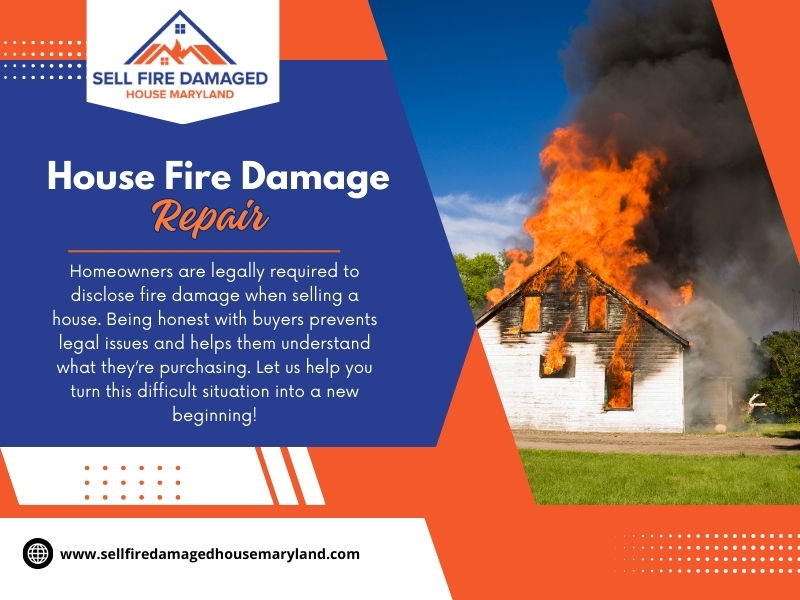House Fire Damage Repair
How To Assess A Fire-Damaged House For Investment Potential?
Investing in a fire damaged house can be a smart way to acquire properties at a lower cost and make a profit after repairs. However, not all fire-damaged homes are worth buying. Some may have too much damage, while others can be restored with proper planning.
If you are considering buying a fire-damaged home for investment, you must assess it carefully to avoid costly mistakes.

This guide will explain how to evaluate a fire-damaged property, understand the costs involved, and determine if it’s a good investment.
1. Understand The Type Of Fire DamageFire damage can vary depending on the fire's size and where it happened. There are three main types of fire damage to look for:
- Structural DamageThis is the most serious type of damage. If the fire was intense, it may have weakened the foundation, walls, or roof. A house with severe structural damage may be unsafe to rebuild and require a complete reconstruction.
- Smoke and Soot DamageSmoke and soot can spread everywhere, even if the fire didn’t burn the entire house. These can leave bad odors, stain walls, and damage electrical wiring. Smoke damage is often hidden but can be costly to clean.c) Water DamageWhen firefighters put out a fire, they use water to soak the walls, floors, and ceilings.
- If not treated properly, this can lead to mold and rot.Before investing in a fire-damaged house, you need to check which type of damage is present and how serious it is.2. Get A Professional InspectionA professional home inspector or structural engineer can check the house thoroughly and tell you whether it is safe to repair or needs major rebuilding. They will assess:
- The foundation and structure of the house• The condition of the walls, roof, and floors• The electrical and plumbing systems• Smoke and water damage levelsNever skip an inspection, as hidden problems can lead to unexpected house fire damage repair costs.
3. Estimate The Repair Costs
Once you know the extent of the damage, you need to estimate how much it will cost to fix the home. Here’s how:
- Minor Repairs If only a small part of the house is damaged (for example, a single room), you may only need to repaint, replace some materials, and remove smoke odors.
- Moderate RepairsThis may include fixing damaged walls, replacing some electrical and plumbing systems, and cleaning smoke and water damage.
- Major RepairsIf the fire destroyed large sections of the house, you may need to rebuild parts of the structure, replace the roof, and install new wiring and plumbing.Always get repair estimates from experienced contractors before making an investment decision.
4. Compare The Price With Market Value
A fire-damaged home is usually sold at a lower price than similar homes in the area. However, you should check:
• The current market price of undamaged homes in the same neighborhood
• How much it will cost to repair the fire-damaged home
• Whether you can sell or rent it at a good price after repairs
5. Check Insurance And Permits
Before buying, check if the house has insurance coverage for fire damage. Some insurance policies may help cover part of the repair costs.
Also, find out if you need special permits from local authorities to repair a fire-damaged home.
6. Understand Financing Options
Not all banks and lenders provide loans for fire-damaged properties. You may need to:
• Pay in cash or find a hard-money lender
• Apply for a renovation loan
• Look for government grants or programs that support fire-damaged home restorationA solid financial plan before purchasing the property will help avoid funding issues later.
7. Consider Selling Or Renting
Once the home is repaired, you can sell it for a profit or rent it out for passive income.
- Flipping the House If you plan to sell, ensure the renovation adds value and makes the home appealing to buyers. A well-renovated fire-damaged home can sell for a good price if marketed correctly.
b) Renting Out the Property If the home is in a good location, you can rent it to tenants for a steady income. Maryland House Fire damage often sells at lower prices, making it easier to recover your investment through rental income
8. Work With Experts
Fire-damaged homes require specialized repairs, so work with experienced:• Contractors• Real estate agents
• Insurance adjusters
• Home inspectorsThey can help you make smart decisions and avoid costly mistakes.
9. Watch Out For Red Flags
Some fire-damaged homes are not worth investing in. Avoid homes if:
• The foundation is severely damaged
• The home has been exposed to the weather for too long after the fire• Repair costs exceed the potential profit
• Local laws or restrictions make rebuilding difficultAlways do thorough research before making a decision.
10. Have A Backup Plan
Always have a backup plan even if you find a fire-damaged property that seems like a great deal. Real estate investments come with risks, and unexpected problems can arise, such as:• Higher repair costs than expected
• Difficulty in getting permits or approvals
• Changes in the real estate market that affect property value• Challenges in selling or renting the propertyHaving a backup plan means preparing for different outcomes. For example, if selling the home doesn’t work out, you could rent it for income. If repair costs become too high, you might negotiate with insurance companies or seek alternative financing.
Conclusion
Fire-damaged homes can be great investments if assessed carefully. You can make a smart buying decision by checking the type of damage, getting professional inspections, estimating repair costs, and understanding market conditions. However, always be cautious and work with experts to avoid risks. If done right, investing in a fire-damaged home can lead to high returns and new real estate opportunities.
